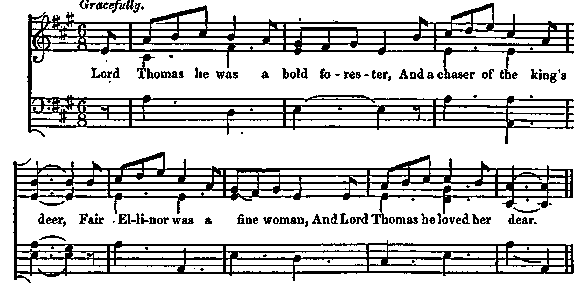Popular Music Of The Olden Time Vol 1
Ancient Songs, Ballads, & Dance Tunes, Sheet Music & Lyrics - online book
| Share page | Visit Us On FB |
|
REIGN OF ELIZABETH. |
145 |
||
|
LORD THOMAS AND FAIR ELLINOR.
This traditional version of the tune of Lord Thomas and Fair Ellinor is taken from Sandys' Collection of Christmas Carols. It is, evidently, the air of Wh« list to lead a soldier's life ? adapted for words of a somewhat different measure. (See the opposite page.)
At p. 17 of Eitson's Observations on the Minstrels, in enumerating the prohable " causes of the rapid decline of the minstrel profession, since the time of Elizabeth," he says, " It is conceived that a few individuals, resembling the character, might have been lately, and may possibly be still found, in some of the least polished or less frequented parts of the kingdom. It is not long since the public papers announced the death of a person of this description, somewhere in Derbyshire; and another was within these two years to be seen in the streets of London; he played on an instrument of the rudest construction, which he, properly enough, called a hum-strum, and chanted (amongst others) the old ballad of Lord Thomas and Fair Mlinor, which, by the way, has every appearance of being originally a minstrel song."
The ballad will be found in book L, series 3, of Percy's Reliques of Ancient Poetry, and it is one of those still kept in print in Seven Dials. The black-letter copies direct it to be sung " to a pleasant new tune." See Douce Collection, i. 121. |
|||
|
|
|||
 |
|||
|
|
|||
|
THE FRIAR AND THE NUN.
In Henry Chettle's Kind-hart's Dreamt, 1592, two lines are quoted from the ballad of " The Friar and the Nun." The tune is in The Lancing Master, from 1650 to 1725; in MusicFs Lelight on the Cithren, 1666; in Fills to purge Melancholy ; and in many of the ballad-operas, such as The Beggars' Opera, The Levil to pay, The Jovial Crew, &c. Henry Carey wrote a song to the tune in his Honest Yorkshireman, 1735, and there are three, or more, in Pills to purge Melancholy. In vol. ii. of some editions, and "vol. iv. of others, the title and tune of " The Friar and the Nun " are printed by mistake with the song of " Fly, merry news," which has no reference to them. The ballad of The London Prentice was |
|||